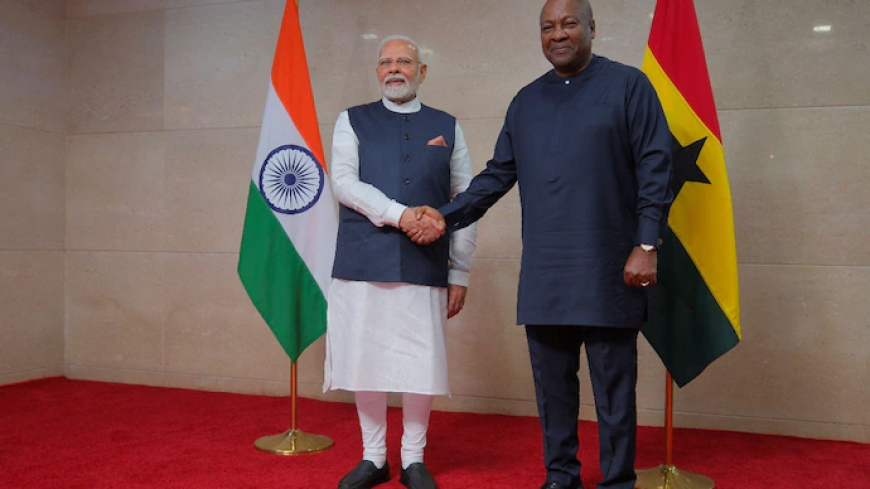PM Modi’s Africa Tour Begins in Ghana: A Strategic Push to Strengthen India-Africa Trade and Tech Ties
Prime Minister Narendra Modi begins a five-nation Africa tour starting in Ghana to boost trade, digital innovation, and strategic cooperation. Read how this visit strengthens India-Africa ties.

ACCRA, Ghana — July 3, 2025
In a bold move to strengthen India's global partnerships, Prime Minister Narendra Modi began a five-nation diplomatic tour of Africa today, with his first stop in Ghana. The visit underscores New Delhi’s growing emphasis on economic diplomacy, particularly in the areas of trade, technology, and sustainable development with African nations. This high-profile tour marks a significant shift in India’s foreign policy outreach, seeking not only to reinforce historical ties but also to deepen commercial and strategic cooperation in a rapidly changing global order.
A Renewed Focus on Africa
India and Africa share a long history of solidarity, tracing back to the Non-Aligned Movement and anti-colonial struggles. In recent years, however, geopolitical competition and the rise of China's influence across the continent have pushed India to redefine its African engagement strategy. PM Modi's tour aims to reboot these ties through targeted economic cooperation, innovation-driven collaboration, and mutual capacity-building.
Ghana, a democratic and economically stable West African country, represents an ideal launchpad for India’s vision. Modi was welcomed in Accra with ceremonial honors and held bilateral talks with Ghanaian President Nana Akufo-Addo. Discussions focused on expanding trade volumes, co-developing digital infrastructure, and promoting Indian private sector investments in renewable energy, education, and healthcare.
Economic and Trade Diplomacy at the Core
According to government sources, India is expected to sign multiple bilateral agreements with Ghana, including frameworks for:
-
Trade facilitation and duty concessions on select goods;
-
Joint ventures in the pharmaceutical and agri-tech sectors;
-
Collaboration in digital public infrastructure, modeled after India’s success with Aadhaar and UPI systems.
Currently, India is among Ghana’s top five trading partners. Bilateral trade between the two nations stood at approximately USD 2.6 billion in 2024, with Indian exports comprising refined petroleum, pharmaceuticals, and machinery. With this tour, both governments are targeting a 40% growth in trade by 2027.
Boosting Technology and Digital Innovation
India's proven strength in digital innovation forms a key pillar of Modi’s outreach strategy. Delegates from India’s Ministry of Electronics and Information Technology, alongside executives from major Indian tech firms, are accompanying the Prime Minister.
Key proposals discussed include:
-
Setting up Digital India Hubs in Africa to enhance digital literacy and public access;
-
Providing Indian software solutions for African banking and fintech services;
-
Establishing joint research centers in Ghana and other partner countries for AI, blockchain, and climate tech innovation.
An official from NASSCOM stated, “Africa’s young and tech-savvy population presents a massive opportunity. India’s experience in scaling public digital infrastructure can be replicated for mutual benefit.”
Strengthening South-South Cooperation
In line with India's commitment to South-South cooperation, Modi's visit reinforces the idea of mutual development without a neo-colonial framework. Unlike Western or Chinese investments, Indian aid and loans in Africa often come with minimal strings attached, focusing on training, skill development, and infrastructure support.
India has already extended more than USD 12 billion in concessional loans to African nations over the last two decades. Modi’s tour is likely to announce further grants and new Lines of Credit (LoC) for solar energy projects, rural water supply schemes, and IT capacity-building programs.
Geopolitical Significance of the Tour
Modi’s African tour is also seen as a counterbalance to China's Belt and Road Initiative (BRI), which has resulted in a strong Chinese presence across Africa’s critical infrastructure. While China’s influence is mostly investment-driven, India’s approach hinges on people-to-people connection, cultural diplomacy, and democratic values.
The visit comes at a time when India is increasing its role in global governance, including through platforms like the India-Africa Forum Summit, IBSA, and the Global South Voice initiative. Diplomats suggest the tour is aimed at gathering broader support for India’s aspirations at the UN Security Council and other multilateral forums.
Upcoming Stops and Agenda
Following Ghana, PM Modi is scheduled to visit Kenya, Tanzania, Mozambique, and Zambia over the next ten days. The agenda includes:
-
Bilateral meetings with heads of state;
-
India-Africa Business Conclaves hosted by CII and FICCI;
-
Inauguration of Indian-funded development projects;
-
Cultural and diaspora interactions to strengthen Indian soft power.
In each country, India is expected to roll out new policy initiatives tailored to local needs, demonstrating a more adaptive and respectful model of international cooperation.
Conclusion
PM Modi’s African tour, starting in Ghana, is more than just symbolic. It represents a timely recalibration of India’s foreign policy priorities in a world where economic influence and technological leadership increasingly shape diplomacy. By prioritizing trade, technology, and developmental partnerships, India is making a clear statement: Africa is not just a beneficiary of aid but a strategic partner in global progress.
This tour has the potential to open a new chapter in India-Africa relations—one that is equitable, future-focused, and deeply collaborative.














